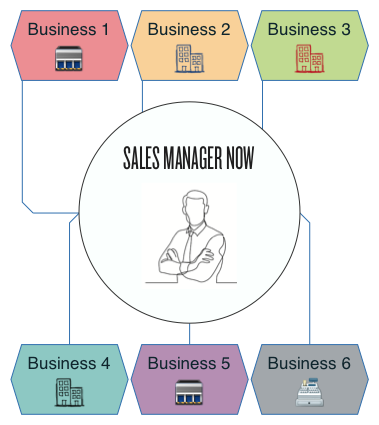Exploring Fractional Sales Leadership If your business has made it past the ten-year mark, it…

How to Interview a Sales Candidate
Here you are again. You have a sales opening to fill and you need to know how to interview a sales candidate.
So, what is your interviewing process? Are you trying to get better at it? Have you actively done something to improve your interviewing skills so that you know how to interview a sales candidate? If not, you should—if you need to fill an important sales position, you need to make the skill and preparation for interviewing sales candidates an absolute priority.
In your own job-hunting experiences, think about a really good interview you went through. Not the easiest interview. Think about the thorough interview when the interviewer was not just friendly and personable, but actually got to know you as it related specifically to the role you were interviewing for based on your past job experiences and knowledge.
Now recall one really bad interview experience. Was it more interrogation and intimidation than interview? Or perhaps more about your likes and interests than the key job experiences on your resume that you felt were highly relevant to the role you were seeking? Without a doubt, interviewing is a critical, decision-making skill critical for both the job candidate and your company.
Ask Useful Questions When Interviewing Your Sales Candidate
Years ago, I was introduced to an interview process called Targeted Selection. The premise is predicting future performance based on past experiences. In Targeted Selection, the interviewer asks thoughtful, topical questions that pulls actual experiences out of the interviewee.
Targeted Selection is much different than saying, “Tell me about yourself,” then reacting to comments along the way. This is certainly a suitable way to begin an interview, but it should only be at the beginning and last no longer than five minutes. Why? The danger comes when you as an interviewer lock-in on one interesting fact and the interview becomes lost in something like: “What! You love to fish? Me, too! I just got a new fishing boat and…”. Fifteen minutes later, you know their best fishing stories and nothing about their ability to sell, communicate or negotiate. It isn’t a bad thing to connect on a common interest, quickly, but that’s not the objective of the interview. Have some self-control. (If the candidate ends up being hired, you have a company host for the next customer fishing trip.)
What You Need to Find Out When You Interview Your Sales Candidate
Time is valuable. What you need to find out from candidates is this: Is this person qualified for the role based on their past roles and experiences that specifically tie to the role you need to fill? This is worth reading again.
Targeted Selection of an employee takes skillful questions based on what you want to uncover. For example, if you want to know how a person handles conflict, you must specifically ask about it. One way to do this might be, “Share a time when you and a customer or a fellow employee had a strong disagreement. What was the disagreement about? How did you handle it? What was the outcome? And please be specific.” This is an effective way to find something out about a candidate versus asking them, “How do you handle conflict?” The latter approach allows the candidate to say what they think you want to hear. The first approach is clear and direct.
You Are In Control
If a candidate begins to answer something like, “Well, if I had a situation like that…” No. Not acceptable. You don’t want to hear how they would handle something “ideally.” Simply redirect them with, “Wait, I want to hear specifically about a disagreement you had in the past.” You are in control of the interview. They may say, “I’m going to need to think about this.” That can be good. You can interject with, “Take your time.” Remember, you are trying to predict future performance based on past experience. Don’t be afraid to interject, “Please be specific.” This type of interview requires interviewees to really think and remember. Be patient while they search their memory for a good example.
Here’s another example. You want to find out if the candidate has persuasive qualities. An interview questioning approach could be: “Give me a time when you had to convince someone to try a product. What was the product? How did you go about it? Tell me about the customer. What was the outcome?” Again, the candidate is forced to share a past experience that often will predict future performance. Oh, and if a candidate asks you to repeat a question or questions—do. Again, be patient. You want good information to make a good decision.
There are other tools you can use to find out more about a candidate. I would recommend having a candidate interview with more people. Interviewing two-on-one is very effective, but it must be well-coordinated as to who will ask about what. Obviously, background checks and referrals are other ways to get a balanced evaluation of a candidate. Competency tests are available, too, with a nominal fee.
Be Prepared
As you interview future candidates, prepare for the interviews with very specific areas you want to uncover, including work ethic, team skills, following policy, integrity, presentation experience, handling objections, organizational skills, temperament, handling conflict. The list goes on, but you can target those areas you want to uncover. Have everything you want to know about that candidate prepared, crafted and in front of you on paper. Then, take thorough notes as the candidate answers. This is so important. Too often we remember what we want, but we hear what we need.
Here you are again. You have a sales opening to fill. Interview time! Invest in the time to prepare in order to select that soon-to-be employee in a targeted fashion. Remember, you are trying to predict future performance based on past experience.
For more examples of Targeted Selection interview questions, click here.
Follow Noel Ledermann on Linkedin




[…] a solid interview process. What is your process for interviewing and how does the candidate progress throughout? You […]